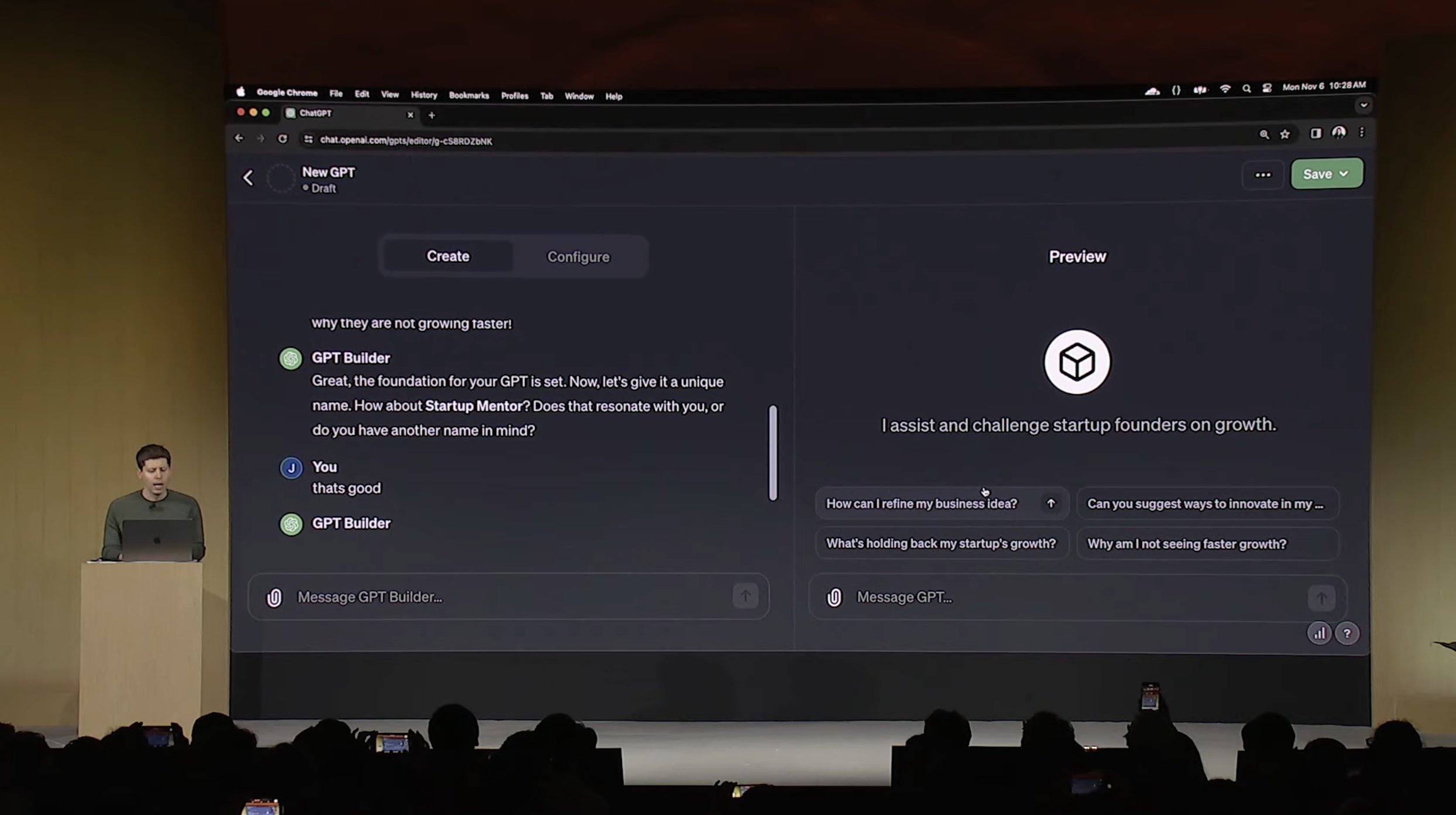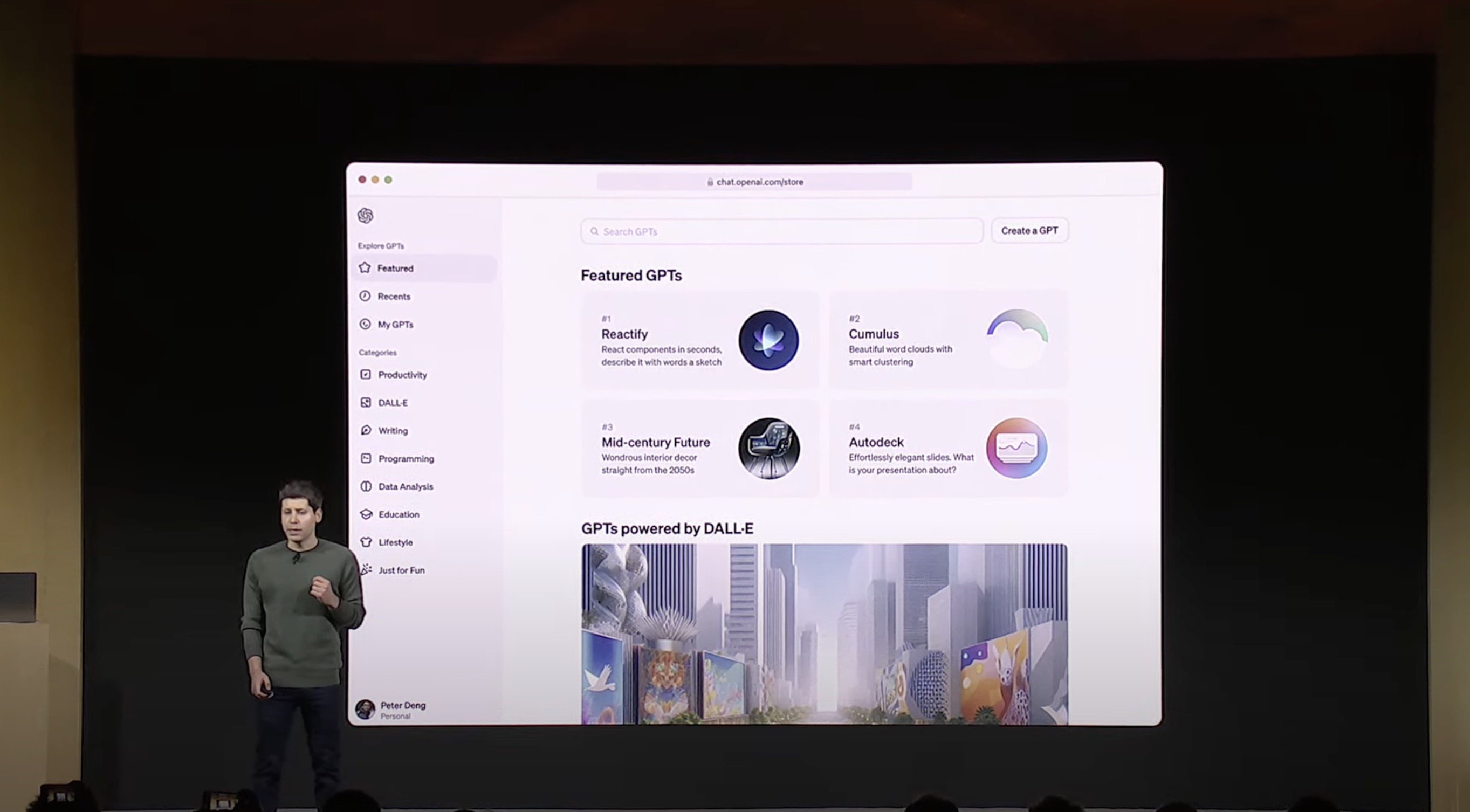OpenAI Unveils "GPTs" and the Revolutionary "GPT Store" - A beginning of App Store ecosystem for AI
Introduction: A No-Code Revolution
In an unprecedented move that's set to redefine the landscape of artificial intelligence and digital entrepreneurship, OpenAI has launched its innovative "GPTs" framework and the accompanying "GPT Store." Heralding a new era of AI-powered applications, OpenAI's groundbreaking initiative is much more than a technological advancement—it's a no-code revolution that promises to democratize AI, spur creativity, and empower individuals to contribute to and thrive in a burgeoning AI ecosystem.
Unpacking "GPTs": Custom AI Agents at Your Fingertips
"GPTs" is a suite of specialized applications and AI agents, meticulously designed on the robust foundation of the GPT architecture. Each agent is tailored to manage specific tasks, ranging from content creation to complex data analysis. What sets "GPTs" apart is its user-centric approach: building a custom AI doesn't require a coding background. With a builder that operates on natural language input, creating a sophisticated AI agent is as simple as describing what you need in your everyday language.

Imagine needing a personal assistant to schedule your meetings, manage your emails, or even generate reports. Instead of browsing through a myriad of apps with rigid functionalities, you can now craft an AI that aligns perfectly with your unique requirements. The transformative power of "GPTs" lies in its flexibility and its capacity to understand and execute tasks just as you envision them.
The "GPT Store": A Marketplace of Innovation
The "GPT Store" is the next big leap, akin to the revolution sparked by Apple's App Store. It is a digital marketplace where developers and creators can publish and monetize their custom-built AI agents. By leveraging the GPT framework, the "GPT Store" is not just a repository of applications but a dynamic platform that nurtures a thriving community of innovators and users.

This initiative is more than just a commercial venture; it's an economic catalyst that opens up new revenue streams for creators while providing users with a vast selection of AI solutions. OpenAI's decision to share revenue with AI agent creators is a testament to its commitment to fostering an equitable and sustainable ecosystem where everyone—regardless of their technical expertise—can participate and profit.
The Deep Meaning: Democratization of Technology
The essence of this technological leap is not merely in its capability to perform tasks but in the paradigm shift towards the democratization of technology. By lowering the barriers to entry, OpenAI is not only paving the way for widespread adoption of AI but also instilling a sense of ownership and empowerment among users and creators alike.
In the pre-GPT Store era, creating and deploying AI solutions was an endeavor restricted to those with significant programming knowledge and resources. This exclusivity often meant that the benefits of AI advancements were not evenly distributed. With "GPTs" and the "GPT Store," however, we are witnessing the dismantling of these barriers, ushering in an inclusive future where AI is by the people, for the people.
Potential Impact: How It Might Change Our World
The implications of "GPTs" and the "GPT Store" are profound and far-reaching. For consumers, it translates into a more personalized and efficient digital experience. For entrepreneurs and businesses, it opens up a wealth of opportunities to innovate and cater to niche markets, potentially driving economic growth and fostering a new wave of tech-enabled businesses.
In education, teachers could customize AI tutors to accommodate different learning styles and needs, making education more accessible and personalized. In healthcare, bespoke AI could help manage patient data, assist in diagnosis, and provide support for mental health. The possibilities are endless, and as the technology matures, its impact will only deepen.
Comparing "GPT Store" with Apple's App Store
Drawing parallels between the "GPT Store" and Apple's App Store can help us understand the magnitude of OpenAI's initiative. The App Store was transformative because it created a platform where developers could reach a global audience without the need for physical distribution. It gave birth to a new economy and changed how we perceive software consumption.
The "GPT Store," in a similar vein, is set to disrupt how we interact with and utilize AI. It could lead to the emergence of 'micro-applications'—highly specialized AI agents developed by individuals to address specific challenges. This shift promotes not just consumption but also creation, fostering a more active and participatory digital environment.
Challenges and Considerations
However, with great power comes great responsibility. As AI agents become more integrated into our daily lives, issues of privacy, security, and ethical use become increasingly important. OpenAI's initiative must navigate these challenges thoughtfully, ensuring that the "GPT Store" is not just a hub of innovation but also a beacon of trust and safety for its users.
Moreover, the success of the "GPT Store" hinges on the quality and